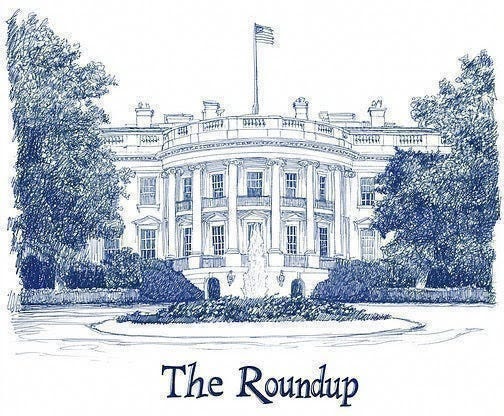Please click here to opt in to receive the Executive Functions Roundup via email and to subscribe to Executive Functions.
Prosecutors in the Eastern District of Virginia told the court they would not comply with its Oct. 24 instruction to provide discovery on New York Attorney General Letitia James’s anticipated selective-prosecution motion, arguing that James must first meet a high evidentiary threshold before obtaining such materials. (Notice.)
Judge Cameron McGowan Currie (E.D. Va.) ordered the government to provide a complete transcript or recording of all remarks made by U.S. Attorney Lindsey Halligan to the grand jury in former FBI Director James Comey’s case, after finding omissions in the materials previously submitted for in camera review. (Order.) Benjamin Wittes and Anna Bower analyzed the prosecution’s case against Comey. (Lawfare.)
Judge David C. Joseph (W.D. La.) on Tuesday denied a habeas petition, holding that ICE may detain noncitizens classified as applicants for admission in removal proceedings without bond under 8 U.S.C. § 1225(b)(2). (Memorandum Ruling.) Kyle Cheney noted that Judge Joseph is the third federal judge to rule in favor of the administration on the issue, while roughly 120 have ruled against it. (X.)
Judge Amir H. Ali (D.D.C.) issued a preliminary injunction ordering the White House to resume providing ASL interpretation during all presidential and press secretary briefings, finding the administration’s failure to do so likely violates the Rehabilitation Act. (Opinion and Order.)
A federal judge in the Northern District of Illinois stated that “some sort of temporary restraining order” was likely warranted after hearing testimony about “unnecessarily cruel” conditions at a suburban Chicago ICE detention facility. (NYT.)
Defense Secretary Pete Hegseth announced on Tuesday that the U.S. had killed “two male narco-terrorists” in another strike on an alleged drug vessel in the eastern Pacific Ocean. (X.) (NYT.) Frank Kendall discussed the offensive, stating that President Trump and Secretary Hegseth have filled the military’s legal ranks with lawyers “who will not say no,” putting “military leaders in an untenable position.” (NYT.)
Transportation Secretary Sean Duffy on Tuesday stated that the administration may “close certain parts of the airspace” due to a shortage of air traffic controllers if the shutdown persists. (NYT.)
White House press secretary Karoline Leavitt on Tuesday clarified that the administration is “fully complying” with a court order to pay federal food assistance amid the shutdown after President Trump stated that benefits “will be given only when the Radical Left Democrats open up the government.” (WSJ.) (Truth Social.)
Steve Vladeck previewed the issues at hand as the Supreme Court hears oral argument on President Trump’s imposition of tariffs under the International Emergency Economic Powers Act (IEEPA) today. (One First.) The Wall Street Journal Editorial Board contended that a decision blessing unlimited presidential tariff power would be a “calamity for the country and its constitutional system.” (WSJ.) Adam Unikowsky argued that under the Court’s own Major Questions Doctrine precedents, the tariffs must go down. (Adam’s Legal Newsletter.)
Alan Rozenshtein argued that the process by which the U.S. arrived at a TikTok agreement marks “a profound institutional failure.” (Lawfare.)
Trent Buatte discussed the legal implications of the Trump administration’s detention and repatriation of two men who survived an Oct. 17 strike on an alleged drug smuggling boat. (Lawfare.)
Pending Interim Order Applications Involving the U.S. Government in the Supreme Court
Blanche v. Perlmutter: The government filed an emergency application on October 27 requesting the Supreme Court to stay a district court interlocutory injunction that temporarily reinstated Shira Perlmutter to her role as Register of Copyrights while litigation over her removal continues. Chief Justice Roberts formally set a deadline of November 10 for a response to the application.
Trump v. Illinois: The government filed an emergency application on October 17 requesting the Supreme Court stay a district court order barring the deployment of the National Guard to Illinois. Justice Barrett formally set a deadline of October 20 for a response to the application. Illinois and the City of Chicago submitted a response on October 20. President Trump filed a reply on October 21. On October 29, Justice Barrett requested supplemental briefs to be filed by November 10.
Trump v. Orr: The government filed an emergency application on September 19 requesting the Supreme Court to stay an injunction issued by a district court that requires the State Department to allow transgender and nonbinary people to choose the sex designation on their passports. Justice Jackson formally set a deadline of October 4 for a response to the application. Orr submitted a response on October 6, and President Trump filed a reply on October 7.




